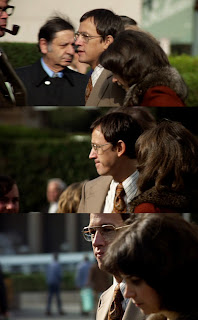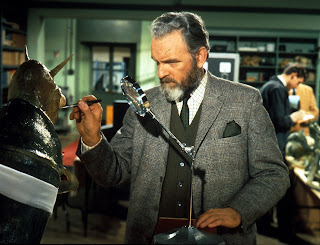INTRODUCTION
Squeezed in between the two powerhouse Godfather films The Conversation can easily be overlooked, when one considers the career of Francis Ford Coppola. That's a shame, but not that surprising.
The Conversation is a film devoid of high profile scandals, and uncharacteristically timid in its visual approach. It doesn't have the grandeur of the Corleone family, or the madness of the Vietnam war to overload our senses. Instead, this is a quiet film that blends in with the wallpaper. It's Coppola's most intimate film, and perhaps his most personal as well?
STORY
The story deals with a surveillance specialist, Harry Caul (Gene Hackman), who has recently completed an assignment, where he was asked to record a conversation between a young couple who seems to be having an affair. As he is about to deliver the tapes to his client, he begins to suspect foul play. He refuses to hand over the recordings. The tapes are dangerous, he's warned. Someone may get hurt. This is not the first time Harry's recordings have put people in danger, but he won't make the same mistake again.
What will his client do to get the tapes? Can he trust his co-worker? Is he being followed?Already overcautious to a fault, Harry soon descents into full-blown paranoia. When you can't trust anybody, how can you even trust yourself?
REVIEW
The opening scene of The Conversation is famous. It deals with the actual recording of the titular conversation, in a wonderful, unruly, documentary style montage. The soundtrack switches back and forth between the various microphones recording the event, and the broken pieces of the dialogue is mixed with loud incidental music. We strain to decipher the meaning of the dialogue, based on limited information. It's frustrating, in a very satisfying way (does that make sense?) and you shouldn't be surprised if you catch yourself leaning towards the screen to hear better. It's fascinating to watch Harry Caul go back to the tapes later in the film in an attempt to uncover the truth, but what is the truth? How will we know, when the meaning of the conversation changes every time we hear it?
A lot of people in the information delivery business these days should watch this film and take notes. Interpretation of information is an interesting and increasingly relevant discussion to have. It seems to me that the more information we get, the less effective we become at processing it.
The first 10 minutes of The Conversation represents a lost art. A way of making movies that no one seems capable of doing these days, or maybe no one dares. The scene feels like random documentary footage. No one explains to us what it all means, no one takes our hand and says "this is how you're supposed to feel". We know nothing, we assume everything, and we won't know for sure until the very end of the film.
The real center centerpiece of the film, though, is Gene Hackman.
The character of Harry Caul is far removed from Hackman's other famous screen personas, be it Little Bill, Jimmy Doyle, or even Lex Luthor. None of these characters ever became one with the wallpaper, but Harry does, and Hackman plays the part so differently than the take-charge guys we've come to know him as.
Harry is cold and distant - emotionally unavailable, as the phrase goes. He's unapproachable, unlovable, untrusting. He seems to hunger for personal connection, and yet the character is so eager to be isolated that he even tries to escape from the camera. At one point he leaves a shot, and the camera follows him, when it becomes clear that he's not returning to the frame, but then Harry leaves again, when the camera once again finds him.
The conflicted nature of Harry's being is where I suspect we'll find the link to Francis Ford Coppola's personal life. The film was written in 1966, well before Coppola became a household name. It was released in 1974, before The Godfather, part 2 cemented his career, and earned him no less than three Academy Awards.
However, when one considers the raging talent on the verge of breakdown that we see in the behind the scenes footage from Apocalypse Now (1979), it seems clear to me that Coppola was always, to some extent, a man driven by fear. The fear of failure, fear of having his work taken away and bastardized, fear of losing those around him. We know how important family is to Coppola. It doesn't seem unreasonable to think that Harry is the result of Coppola meditating on his own demons, by giving the character all of his own flaws, and none of his success.
I haven't heard Coppola's own thoughts on this, and I prefer to make up my own mind, before I let Coppola offer his version. When it comes to talking about Coppola's films, no one does it better than Coppola himself. His audio commentaries for the two Godfather films (what third?) are legendary, as is the feature length documentary Hearts of Darkness (1991), detailing his struggle to create Apocalypse Now, which brings us to this new Blu-ray release.
BLURAY
So finally The Conversation makes its Blu-ray debut. Good call people. StudioCanal in England is responsible for this Blu-Ray/DVD combo release.
The problem with this film, indeed with most films more than 5 years old, is that they were not made for the kind of high-def sets most of us have today. Adding to that is the fact that many films of the '70s embraced a rough, dirty, gritty look. This means that The Conversation is a very grainy Blu-ray. The opening Paramount logo and the first shot looks HORRIBLE, but don't worry. This is often the case with older films. As we get further into the film it takes on a pleasant, if somewhat inconsistent, look. It's still grainy, and it still looks rough, but that's the intention, and if you don't like that, stick to CGI animated films and you'll be fine.
I did notice a few shots, when the image seemed slightly soft, suggesting a bit of digital noise reduction, I also noticed "fixed grain" a couple of times, where a sort of "net of grain" sticks to the image when the camera moves. Don't get me wrong, you're not going to find a better version of this film out there, but don't watch this right after a super clean, high def, modern film, it won't hold up to that comparison.
As I mentioned earlier, I deliberately avoided watching any of the special features before I wrote this review. The main features among the extras are the two audio commentaries - one with Coppola, the other with Walter Murch. I can't wait to delve into these, maybe they'll earn a separate post! A vintage featurette "Close-Up on The Conversation" is included, as well as screen tests, a few interviews and other tidbits. A very nice package.
I can't stress this enough: If you want to learn how to make films, or just learn to appreciate films better, you need to sit down and listen to an audio commentary by Francis Ford Coppola.
FINAL THOUGHTS
Few films capture paranoia the way The Conversation does. Watching Harry Caul's life fall apart is devastating. Coppola is unrelenting as he slowly dismantles this already broken man right before our eyes, leading up to a heartbreaking, gruesome ending.
This is an unromantic, endlessly cynical film, devoid of any illusions of redemption. Like its central character it often feels distant and cold. It's a film that should be approached cautiously, with knowledge of its place in time and in film history, and with a minimum of appreciation for the technical aspects.
The Conversation is not easy to watch, but whoever said that a masterpiece should be?
ACKNOWLEDGEMENTS
Thanks to StudioCanal and Olivia Jarvis for making this review possible.

















